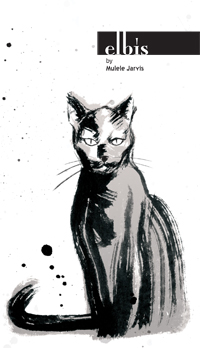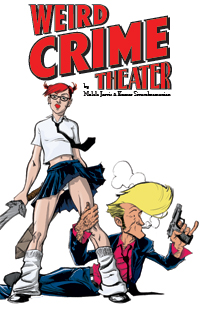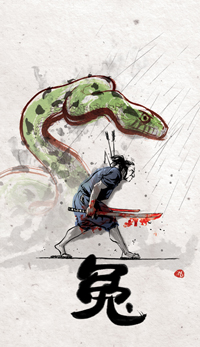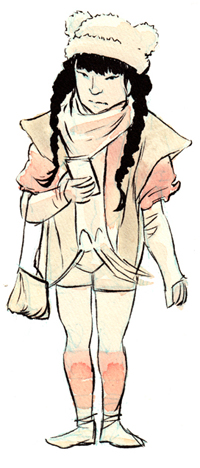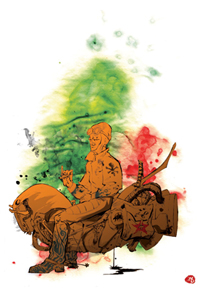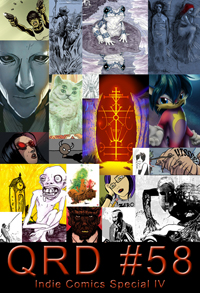
February 2013
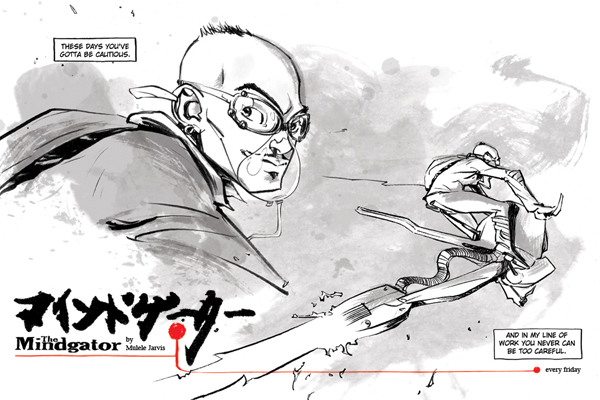
City: Tokyo
Comics: The Mindgator, Elbis, Weird Crime Theater
Websites: www.mulele.com
QRD – How old were you when you first got into comics & did you always stick with them or did you come back to them?
Mulele – I first got into comics when I was 3 or 4. I couldn’t read them but I used to copy the pictures out of the book. I think at the time it was an extension of the Batman TV show, which I loved back then.
QRD – What was the first comic book you ever bought?
Mulele – Was too young to remember, but probably Batman.
QRD – How old were you when you put out your first comic?
Mulele – Professionally, I was 29 when I debuted at Dark Horse Comics. Prior to that I never considered putting out my own comic.
QRD – What decade do you think produced the best comics?
Mulele – I never really looked around before, but the number of independent publishers & webcomics currently putting out good material is inspiring.
QRD – Why comics instead of just writing or drawing?
Mulele – I’m a storyteller who draws. What better medium is there for me?
QRD – Do you see mini-comics & indie comics as paths to mainstream comics or as their own unique media?
Mulele – Money is not commensurate with quality. The only thing the mainstream has is distribution (outside of the internet) & the ability to make toys. I see the mainstream as a marketing tool for independent creators.
QRD – How many copies of your comic do you print in your first run?
Mulele – I haven’t ever had to worry about that so I don’t know. I am going to print my first indie book For What Do You Fight? next month & I’m going to start with 200. We’ll see how it goes from there.
QRD – How much do you think comics should cost?
Mulele – No more than they have to. But I think there is a line that is crossed when I can’t justify the quality of the read with the price of the comic. 4 bucks for 24-pages is a bit high. Especially for a mainstream book.
QRD – How many books do you produce a year & how many would you like to?
Mulele – Very sporadically until now, but I’m planning on producing about one complete story plus supplemental material per year from now on.
QRD – Do you think stories should be serialized or delivered as complete works?
Mulele – Depends on the project & the structure of the story. I believe the format should fit the story.
QRD – How are comic strips different than comic books & which medium do you prefer?
Mulele – I don’t know. I just like good comics.
QRD – How long is it from when you start a comic until it‚s printed?
Mulele – As long as it takes. Probably too long. I’m getting better, though.
QRD – What do you do better with your comics now than when you first started?
Mulele – Every part of the comic I do better than before. I’m more confident as a writer & I’ve been able to hone my art to a system of production so it’s not as randomly good or bad, but hopefully constantly good.
QRD – Do you do thumbnails?
Mulele – Yes! All things I do are better if they are planned. My thumbnail sketches are quite loose, though.
QRD – At what size do you draw?
Mulele – I draw at B4 size. (13.9 x 9.8 in)
QRD – What kind of pens do you use?
Mulele – I use Japanese fude brushes & some brush-pens.
QRD – What does your workstation look like?
Mulele – I work on a board big enough to hold my paper. When I’m out in the world I can take it with me & draw on the go. I also have a big white desk with a scanner, a printer, a tablet, & an iMac.
QRD – At what point in the artistic process do you work digitally?
Mulele – I draw on Japanese paper so light you can see through it. I scan them into the computer & compile my pages digitally. I try not to draw anything using the computer these days.
QRD – What do you think of digital comics & webcomics?
Mulele – Just another way to get your work out there. You can also play with the presentation of the comic a bit more. It’s totally valid.
QRD – Do you prefer working in color or black & white?
Mulele – I prefer color, but it takes a lot of time & my color theory isn’t what I want it to be so I work primarily in black & white.
QRD – How many different people should work on a comic & what should their jobs be?
Mulele – One comic, one creator is best, but collaborations can be fun. They should split up the duties as they like. I just want a good read.
QRD – How do you find collaborators?
Mulele – I find them difficult when their goals are different to mine.
QRD – How tight do you think a script should be as far as telling the artist what to draw?
Mulele – The script should provide structure & background for the artist to draw from. I don’t think the artist should stray from the script too much; but like every collaborative effort, if there is a problem, good communication will work it out.
QRD – What comic book person would you be most flattered to be compared to?
Mulele – Flattery & 4 bucks will get me a cup of coffee at Starbucks & nothing more.
QRD – What do your friends & family think of your comics?
Mulele – My girlfriend recently commented, “With artwork like this, how are you not more famous?”
QRD – What do you think of superheroes?
Mulele – I don’t.
QRD – Marvel or DC?
Mulele – They’ll come around someday.
QRD – What comic characters other than your own would you like to work with?
Mulele – None. I think every character & story speak to the needs & wishes of their creators. To work with someone else’s character is uncomfortable. If you see me doing that, there was either money or feelings involved.
QRD – Ideally would you self-publish?
Mulele – Yes. There is much satisfaction in controlling every part of production. Even when I make a mistake, that’s MY mistake. Pride!
QRD – What conventions do you try to attend & why?
Mulele – I’ve been to San Diego & New York Comic cons. Fun to meet people, but really they just make me tired. & the cost of flying out from Tokyo is prohibitive.
QRD – What do you do to promote your books?
Mulele – So far, hit up websites & beg my friends to buy copies of my book. I’m still quite new at marketing so I’m still figuring this out.
QRD – Do you think your comics are well suited to comic shops or would sell better elsewhere?
Mulele – I think they would be fine at comic shops, but sometimes I make things that bend the idea of a comic a little too far for some retailers.
QRD – What other medium would you like to see some of your comics made into (television, film, games, action figures, etc.)?
Mulele – Anything is fine. At that point it’s just money in my pocket & I can produce my next book with less of a fight with my wallet.
QRD – Do you consider yourself a comic collector or a comic reader or both?
Mulele – I’m a creator more than a user.
QRD – What do you see as the most viable mediums for comics distribution 10 years from now?
Mulele – The internet. I think we are already there for comics & as an indie creator it’s your best bet for sales & promotion.
QRD – What would you like to see more people doing with comics?
Mulele – Reading them.
QRD – Anything else?
Mulele – Not that I can think of at the moment.







